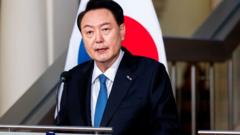In a dramatic turn of events, South Korea's President Yoon Suk Yeol ordered the arrest of the leader of his own ruling party, Han Dong-hoon, along with key opposition figures. This occurred during a contentious night when Yoon declared martial law amid growing political turmoil. The National Intelligence Service's deputy director accused Yoon of attempting to silence dissenting voices within his government and the opposition, claiming the president seized the opportunity to "wipe them out."
As political parties rushed to hold emergency meetings, the opposition planned an impeachment vote for Saturday, needing a two-thirds majority in the 300-seat parliament. Despite a majority, they require the support of at least eight members from Yoon's party to secure the necessary votes. Han Dong-hoon, initially resistant to the idea of impeachment, publicly identified Yoon's actions as a threat to democracy, stirring unrest within his party. He cited credible evidence linking Yoon to orders for the arrests, prompting significant concern about the president's mental state and governance skills.
South Koreans anxiously awaited news on Yoon's presidency, as opposition politicians vocally challenged his leadership outside the parliament. Reports emerged indicating that Yoon intended to confront parliament, but his office later denied these claims. Opposition members expressed solidarity, chanting "impeach, impeach" while they gathered outside. Special forces commander Kwak Jong-kuen pledged he would not comply with any future martial law orders, reinforcing the deep divisions emerging within state structures.
Just hours after his martial law declaration, Yoon reversed his decision following an opposition-led initiative that saw close to 190 MPs force their way into the assembly to vote against the measure. The abrupt withdrawal shocked allies and investors alike, with Yoon citing 'threats from anti-state forces' and North Korea as his justification for such severe actions. However, it soon became apparent that his motivations were rooted in domestic anxieties and political instability.
The capital city, Seoul, witnessed escalating protests over Yoon's leadership, with crowds demanding accountability and calling for his resignation. Public sentiments revealed a strong backlash against Yoon, as a recent survey showcased that over 70% of South Koreans favored impeachment, further exacerbated by accusations of insurrection against him by law enforcement agencies. His approval ratings plummeted to a record low of 13%, reflecting the sharp decline in public support amidst allegations of corruption and ineffective governance.
The political landscape in South Korea remains volatile as lawmakers grapple with the implications of Yoon's erratic leadership. Observers are closely monitoring the opposition's next moves while public pressure mounts for a resolution to an increasingly precarious political atmosphere.



















